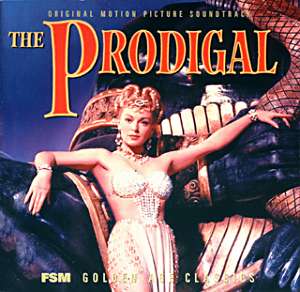************************************************************** RECOMMENDED October 2002 **************************************************************
Bronislau KAPER
The Prodigal
OST
FILM SCORE MONTHLY Vol. 5 No. 9 [75:11]
Available from Film Score Monthly, 8503 Washington Boulevard, Culver City, CA90232; Tel: 1-888-345-6335; overseas: 310-253-9595; fax: 310-253-9588; email: Info@filmscoremonthly.com

The Prodigal (1955) was one the lesser pseudo-Biblical spectacles of the 1950's - pseudo because though based on a parable from Luke's Gospel the story was largely of Hollywood's devising. As an MGM CinemaScope picture the production values were lavish, but otherwise the film has deservedly been virtually forgotten.
Like everything else about the film, the score was on a grand scale, with orchestra, choir, ethnic instruments and male and female vocal soloists. Responsible for the music was Bronislau Kaper, who while not one of the biggest names of the "Golden Age" of the studio system had a long and illustrious career at MGM including working on the 1935 version of Mutiny on the Bounty before penning an excellent score for the 1962 version. The Prodigal was directed by Richard Thorpe, who helmed MGM's Ivanhoe (1952), All the Brothers were Valiant (1953) and Knights of the Round Table (1953), all scored by Miklós Rózsa. The Prodigal was a fairly early entry into the revived Biblical genre, but the template had already been laid with Rózsa's brilliant score for Quo Vadis, a 1950 MGM production. Given the success of that picture and score, and Thorpe's recent working relationship with Rózsa it is not at all surprising to discover many of the hallmarks of the master in Kaper's soundtrack. Indeed, the oddest thing about this typically well produced Film Score Monthly release is the booklet note which suggests that the film "allowed Kaper to depart from the precepts of Newman and Rózsa." Rather the opposite, it would seem Kaper was under instruction to make his score sound as much like Rózsa as possible given the nature of the film. One may even wonder if Rózsa had an uncredited hand in the writing of the score.
Low key melancholy underscore cues such as "18 Pieces of Silver/Beard" sound as if they might have come from Miklós Rózsa's Lust For Life, a 1956 MGM production, while the terse brass writing and unsettling harmonies in cues such as "One Piece of Silver" equally suggest Rózsa. The wordless haunting choirs of "Terrace of Heavens" appears to have drawn inspiration from Quo Vadis… as so on. One may hear hints of Rosza's Hungarian folk writing too; listen to the cello melody in "Micah's Exit/Prayer", and the party music which strongly echoes Rózsa's pseudo-ethnic ancient dance music from Quo Vadis. That said this is a score of a different nature to Quo Vadis, with a more intimate, sometimes pastoral quality, with little room for epic marches and monumental action music. Even so, when a "Fight" does break out, well, it sounds not entirely unlike Miklós Rózsa action music, with some very familiar sounding staccato rhythms and brass fanfares. Actually it sounds so much like Miklós Rózsa that I am going to hazard that he probably did have an unofficial hand in the writing of some sections of this score. If "Samarra's Death", isn't pure Rózsa it's a superb pastiche of his style.
André Previn conducts with appropriate flair and vigour, the stereo sound is remarkably good for 1955 and the presentation is excellent. Whether or not this is the complete score, or simply as much as would fit on a CD, the booklet doesn't say. It is the only omission. The conclusion is easy; if you love the epic film scores of Miklós Rózsa, you should like this. The various pictures of Lana Turner are very pleasing to the eye, though she looked about as much like a middle eastern pagan priestess as does Bugs Bunny.
Gary S Dalkin

Return to Index